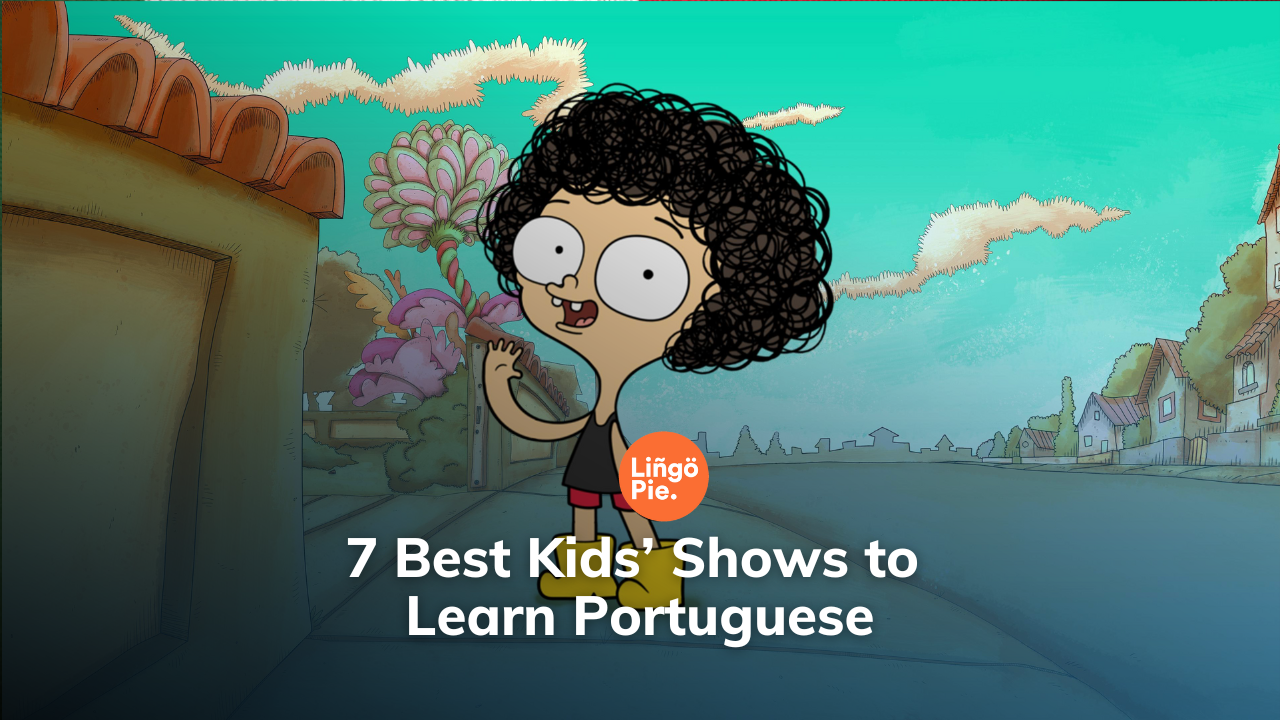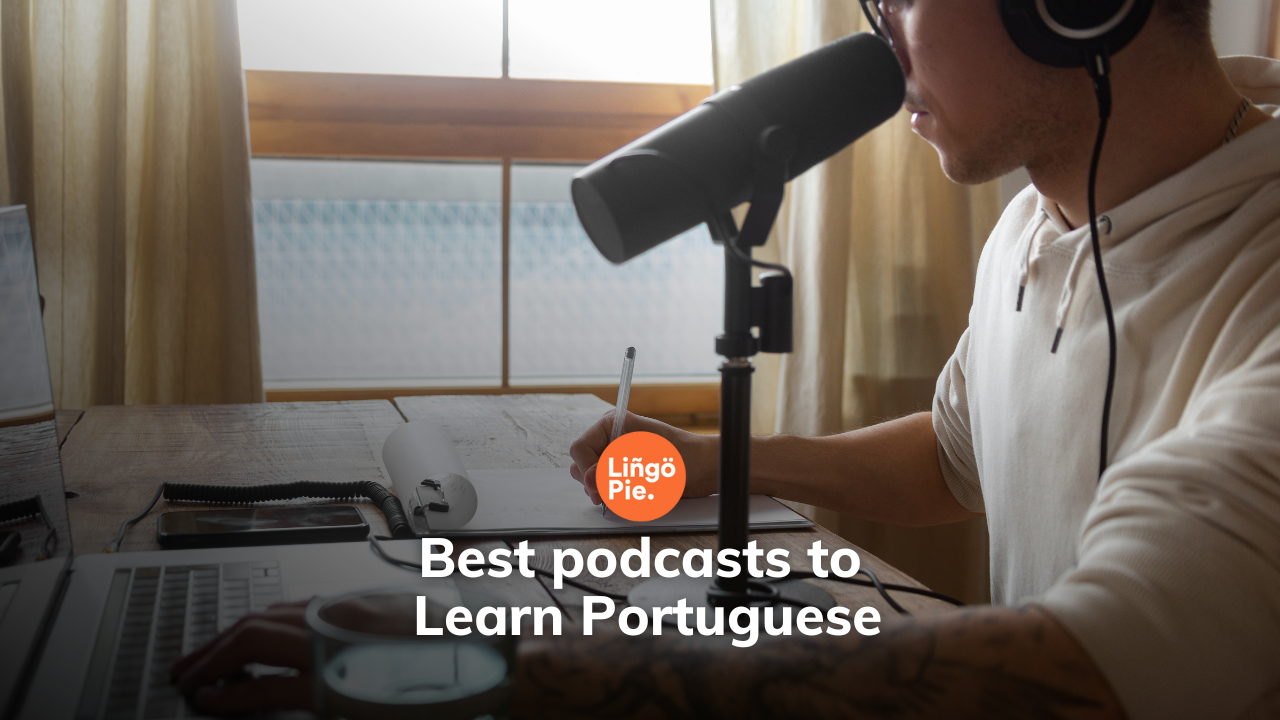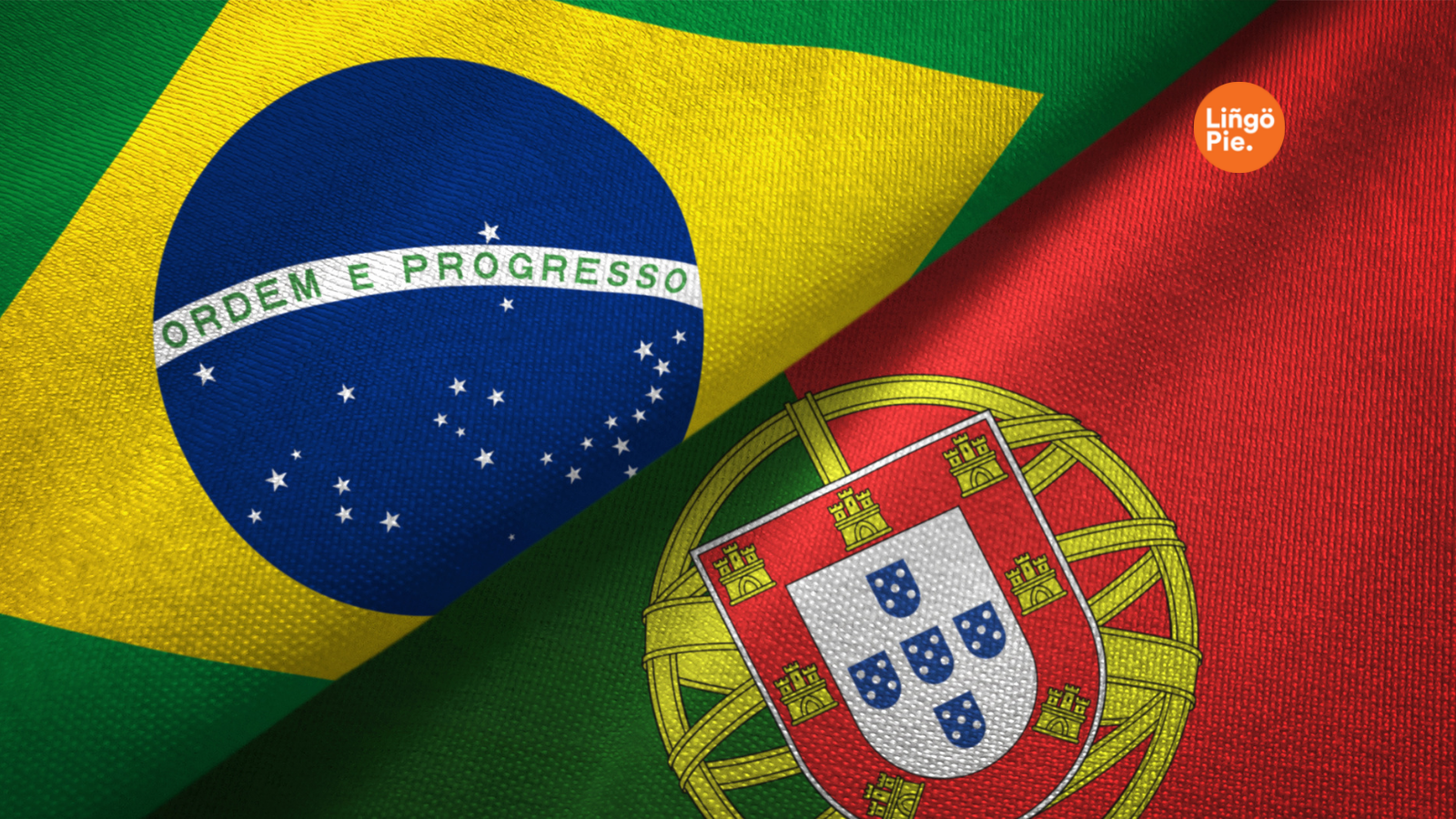So, you’re thinking about learning Portuguese? You’re in the right place.
Portuguese is spoken by over 260 million people worldwide, making it the 6th most spoken language on the planet. Whether you’re dreaming of a trip to Lisbon or planning to sing along to Brazilian bossa nova, Portuguese is a rewarding and surprisingly accessible language to learn, especially if you already speak English or Spanish.
In this guide, we’ll show you how to start your Portuguese journey confidently. You’ll discover how easy Portuguese can be to learn, our top 8 expert tips for mastering the language, and the key differences between Brazilian and European Portuguese. We’ll wrap things up with a few addictive TV show recommendations to supercharge your listening skills.
- 6 Best Portuguese Comedy Movies Everyone Should Watch
- I Love You in Portuguese: A Complete Guide to Romantic Expressions
- 56+ Easy Portuguese Greetings For Total Beginners

Is Portuguese Hard To Learn?
Portuguese is not hard to learn. In fact, if you're an English speaker, you already know about 3,000 Portuguese words without realizing it, thanks to similar words known as cognates. The U.S. Foreign Service Institute also classifies Portuguese as a Category 1 language, one of the easiest for English speakers to learn, estimating around 575-600 hours of study to become fluent, similar to French, Spanish, and other Category 1 languages.
So in general, Portuguese can be an easy language to learn, depending on your mother tongue and any other languages you speak. If you already understand the Latin alphabet, you are at a big advantage. Moreover, if you know other Romance languages, you will find picking up Portuguese vocabulary and grammar much easier.
So, What Makes Portuguese Hard To Learn?
While Portuguese is considered one of the easier languages for English speakers due to shared vocabulary and grammar similarities, it still presents some challenges. For instance, Portuguese is not a phonetic language. This means the written words don't always correspond directly to how they are pronounced, making proper pronunciation more difficult.
Additionally, many Portuguese words look very similar to English words but have different meanings (e.g., "balcão" means counter, not balcony). This means that beginners should keep an eye on these Portuguese false friends to avoid saying the wrong things.
And if we're talking about the technicals, one of the trickiest things in this language is that it has complex verb conjugations. The truth is that Portuguese verbs have numerous conjugations based on tense, mood, person, etc.
How Different Is Portuguese From English?
Portuguese and English may both use the Latin alphabet, but they differ significantly in how they sound, how sentences are formed, and how words change. Portuguese often changes verbs depending on who is speaking and can leave out the subject because the verb form already shows who is doing the action.
In contrast, English usually keeps the subject in the sentence and has simpler verb changes. Portuguese also assigns gender to nouns and uses nasal sounds, which are not common in English.
Here is a table highlighting key differences between Portuguese and English:
| Aspect | Portuguese | English |
|---|---|---|
| Language Family | Romance (Latin origin) | Germanic (with significant Latin and French influence) |
| Verb Conjugation | Extensive conjugation with variations for person, number, tense, mood, and sometimes gender | Moderate conjugation primarily varying by tense and aspect; less variation for person and number |
| Subject Pronouns | Often omitted due to verb conjugation indicating the subject | Generally required to clarify the subject of the sentence |
| Noun Gender | Nouns are gendered (masculine or feminine), affecting articles and adjectives | Nouns are generally not gendered; gender-specific nouns exist but do not affect articles/adjectives |
| Definite Articles | Agree in gender and number with the noun (e.g., o, a, os, as) | Single form (the) used for all nouns regardless of gender or number |
| Pronunciation | Includes nasal vowels and specific consonant sounds not present in English | Contains sounds like the "th" (/θ/, /ð/) that are challenging for Portuguese speakers |
| Rhythm | Brazilian Portuguese is syllable-timed; European Portuguese is more stress-timed | Predominantly stress-timed |
| Vocabulary | Shares Latin roots with English; includes false cognates (e.g., pasta means "paste," not "pasta") | Incorporates Latin and French-derived words; false cognates exist |
| Word Order | Generally Subject-Verb-Object (SVO); more flexible due to inflection | Strictly Subject-Verb-Object (SVO) |
| Diminutives | Frequently uses diminutive and augmentative suffixes (e.g., -inho, -ão) to convey size or affection | Uses separate words (e.g., "little," "big") to convey size or affection |
How To Start Learning Portuguese

One of the first decisions to make when learning Portuguese is which variant you want to focus on: Brazilian Portuguese or European Portuguese. While they share roots and are mutually intelligible, there are notable differences in pronunciation, vocabulary, and even some grammar rules between the two.
- Brazilian Portuguese is spoken by over 200 million people, making it the most widely spoken variant. It has distinct accents, slang, and influences from indigenous languages.
- European Portuguese, spoken in Portugal, follows somewhat closer to the Iberian linguistic roots. The pronunciation tends to be more nasal and less stressed than the Brazilian variant.
The next key tip is to start today. It is too easy to say that you will start learning Portuguese at some unclear future date. Commit now and set attainable goals for yourself to stay motivated.
Try to be consistent with your learning. This means turning up every day to learn, even just for thirty minutes.
Do not over-stretch yourself. Start with the present tense and the most useful everyday vocabulary and build from there, once you have a good basis. Even with one tense and limited verbs, you can begin to make yourself understood.
You can also join online communities to keep motivated or use online resources, such as social media, to learn Portuguese in a fun way. There are a lot of great Instagram and TikTok accounts that create content for Portuguese learners.
Moreover, you can visit Lingopie's site to stream Portuguese movies and TV shows for natural and quality exposure to the language. Lingopie's interactive features optimize your learning potential.
Having fun while you learn is important and leads to the best results. You are much more likely to retain new information if you learned it while enjoying yourself. So, avoid textbook rote learning, and try out our 8 top tips for learning Portuguese instead!

8 Best Tips For Learning To Speak Portuguese
1. Watch Portuguese TV Shows and Movies
One of the most effective ways to reinforce your Portuguese learning is through immersion with native television, movies, and other video content. This allows you to:
- Train your ear to understand natural pronunciation, intonation, and speech patterns
- Expose yourself to common idioms, slang, and conversational phrases
- Pick up on cultural context and nonverbal cues
Start by finding beginner-friendly content with subtitles in Portuguese to read along. As you progress, transition to audio/video without subtitles to sharpen your listening comprehension.
Be mindful of the variant you're studying - Brazilian Portuguese media will sound different from European Portuguese shows/movies. Sticking to content from your target variant will provide the most relevant immersive experience.
Platforms like Netflix, YouTube, language learning apps, and Portuguese broadcasting networks offer a wide variety of shows, movies, news programs and more to supplement your studies with engaging real-world examples.
The key is consistency - make Portuguese video immersion a regular part of your routine for maximum retention and improvement.
Related:


2. Listen To Portuguese Music
Incorporating Portuguese music into your daily routine is an excellent way to reinforce your listening skills and pronunciation in a fun, engaging way. The melodic patterns and rhythms help information stick in your brain.
Here's how:
- Create playlists of Portuguese songs across different genres that you enjoy
- Listen actively when you can, reading along with lyrics to practice reading comprehension
- Sing and rap along to improve oral fluency, accent, and speech patterns
- Pay attention to artist origins - Brazilian and European Portuguese music will sound distinct
Music acts as a memorable and motivating addition to your language studies. You'll absorb new vocabulary, idioms, and grammar structures naturally through repeated listening.
Suggested Artists:
- For European Portuguese: Mariza, António Zambujo, Deolinda
- For Brazilian Portuguese: Caetano Veloso, Gilberto Gil, Marisa Monte
Start with more popular, contemporary hits for an easier entry point before exploring regional styles like funk, fado, samba, bossa nova, and mais.
The more you immerse yourself in Portuguese music's diverse rhythms and rich lyrics, the more your comprehension and overall fluency will improve.
Related:

3. Read Portuguese Books
Reading is one of the most effective ways to build your Portuguese vocabulary and reinforce grammar rules. Unlike listening exercises, reading in your target language allows you to go at your own pace and refer back as needed.
Here are some tips to start reading like a pro:
- Start with beginner-level materials like children's books, short stories, adapted novels, etc.
- As you progress, move to young adult novels, magazines, newspapers, and eventually advanced literature
- Read out loud when possible to practice pronunciation and cement new words
- Keep a notebook handy to jot down unfamiliar words and phrases to study later
- Don't get stuck looking up every single unknown word - prioritize comprehending the overall meaning
The key is making reading a consistent habit. Even 15-30 minutes per day will expose you to context-rich examples of vocabulary, idioms, and grammar in action. This reinforces your skills significantly more than studying individual words.
Oh and the most important tip: Mix up your reading sources - literature, periodicals, websites - to experience different styles. The more Portuguese text you consume, the more your comprehension will improve.
4. Listen to Podcasts And Audiobooks

Listening to podcasts and portuguese audiobooks is a great way to get familiar with spoken language, especially if you do not live in a place with native Portuguese speakers.
Podcasts that feature native speakers will expose you to colloquialisms, slang, and even funny Portuguese phrases and idioms that you can learn to use.
You can learn a lot about Portuguese history, culture, and customs while also getting quality listening practice from podcasts. And the best part is they're fun and engaging!
Write down common colloquial Portuguese phrases that come up in podcasts and try to use them in real-life situations. This will solidify your learning.
Read also:

5. Get a Language Exchange Partner
Conversing with native speakers is crucial for developing listening comprehension and speaking skills. A language exchange partner provides affordable practice through mutual learning.
Just a note though: Language exchange partners are not usually professional teachers, but rather native speakers of your target language who will talk with you online or in person for informal practice.
Action Steps:
- Search online communities (Reddit, Meetup, Conversation Exchange) for partners learning your native language
- Set a regular schedule to split time practicing each language (e.g. 30 mins Portuguese, 30 mins English)
- Discuss everyday topics, ask each other questions, correct mistakes in a supportive way
- For beginners, consider paying a reasonable rate for a tutor to start building conversational skills
Be strategic in your partner selection:
- Match with speakers of your target variant (Brazilian vs European Portuguese)
- Find partners at your level or just above to ensure productive conversations
- Voice/video chat for maximum speaking and comprehension practice
Sometimes, a language exchange partner will want to learn your native language, so you will speak for an hour in your language, then an hour in theirs. This is a mutually beneficial arrangement that doesn't involve payment.
Alternatively, you can pay a Portuguese native to practice Portuguese online with you, without also helping them learn your language.
Is a language exchange partner the same as a tutor?
A language exchange partner can be a qualified and experienced online tutor, or else a friendly native speaker without teaching experience who is happy to chat with you.
You might find that a qualified tutor will cost more per hour than someone who is not an official language teacher.
You can find native Portuguese tutors or language exchange partners online on sites such as iTalki or Meetup.
6. Sign Up For Language Classes
If you like more formal learning with structure and someone qualified to tell you why the grammar rules are the way they are, consider signing up for Portuguese lessons.
Many Portuguese teachers run Portuguese lessons via Zoom or similar video chat sites, so you can study from the comfort of your own home.
Alternatively, you can find local in-person classes. If you find studying Portuguese hard on your own, you will benefit from being in a proper classroom environment.
There are different methods for teaching Portuguese, so find classes that suit your learning style. For instance, some teachers might only speak Portuguese, while others will explain concepts and ideas in English.
Your Portuguese teacher should be a native speaker, or at the very least an incredibly proficient second-language speaker.
You will be able to practice pronunciation with a teacher and get instant feedback on your accent, which will prevent you from picking up bad habits in your speaking.
7. Use Language-Learning Apps
Supplement your learning with language apps in your downtime. A language-learning app will teach you vocabulary and introduce you to grammar points, such as conjugations, tenses, and gender agreement.
These are great resources for learning Portuguese online either for free or at a small cost. Apps are often designed like games so you can learn while having fun.
Learn phrases, verb tenses, basic greetings, and how to conjugate verbs with Lingopie, Duolingo, Rocket Languages, or any other well-reputed language app and give yourself a head-start in your learning journey.
Committing to even five or ten minutes a day of practice with a language app will keep you motivated and help you to solidify your learning.
8. Visit Portugal or Brazil
The ultimate way to gain confidence and accelerate your Portuguese skills is through full immersion in a native environment. After all, this type of opportunity allows you to train your ear to understand natural accents and speaking cadences. It may also give you a chance to naturally absorb linguistic nuances and cultural context.
If traveling isn't feasible:
- Connect with local Portuguese language meetups or social communities
- Participate in online immersion programs with tutors/conversation partners
- Consume movies, shows, music, books, podcasts, social media in Portuguese
- Create a Portuguese home environment (labels, music, TV, cooking)
The more you surround yourself with the living language, the faster your fluency will progress. Incremental efforts count, but dedicated immersion is a game-changer for achieving fluency.
Related:

European Portuguese and Brazilian Portuguese: The Differences

While Brazilian and European Portuguese are technically the same language, there are some key differences that you should note.
When you visit a Portuguese-speaking country, one of the biggest differences you will notice between South American and European speakers is pronunciation. In Europe, some sounds are less pronounced than in Brazil.
Brazilian Portuguese speakers tend to elongate vowel sounds and speak with a more open mouth than their European counterparts.
European and Brazilian Portuguese also use different second-person pronouns. The difference between tu/teu and você/seu in Portugal is formality. However, in Brazil, the latter pronouns are used in informal settings too.
You might also notice when learning Brazilian Portuguese that the gerund is used much more often than in Portugal, where the a + infinitive is more common. Ele está a dançar (Portugal) vs ele está dançando (Brazil), for example.
| Category | European Portuguese (EP) | Brazilian Portuguese (BP) |
|---|---|---|
| Pronouns | Uses "tu" for informal singular "you," with distinct verb conjugations. "Você" is reserved for formal contexts. | "Você" is commonly used for informal singular "you," with verb conjugations matching third-person singular. "Tu" is used in some regions but often with "você" conjugations. |
| Verb Conjugation | Employs the infinitive form with "a" to express ongoing actions (e.g., "estou a ler" – "I am reading"). | Uses the gerund form to express ongoing actions (e.g., "estou lendo" – "I am reading"). |
| Object Pronouns | Typically places object pronouns after the verb (enclitic position), especially in formal writing (e.g., "viu-me" – "saw me"). | Commonly places object pronouns before the verb (proclitic position) in everyday speech (e.g., "me viu" – "saw me"). |
| Pronunciation | Features a more closed and less nasal pronunciation. Final "s" often pronounced as "sh" (e.g., "mais" sounds like "maish"). Tends to reduce or omit unstressed vowels, leading to a more clipped speech pattern. | Exhibits a more open and nasal pronunciation. Final "s" usually pronounced as "s" (e.g., "mais" sounds like "maiss"). Vowels are generally pronounced more fully, contributing to a more melodic intonation. |
| Formality | Maintains a more formal tone in both spoken and written language. Formal pronouns and verb forms are more prevalent. | Adopts a more informal and relaxed tone, even in some formal contexts. Informal pronouns and simplified verb forms are widely used. |
If you decide to learn to speak Brazilian Portuguese, do not worry about being misunderstood in Portugal. The differences are not so great that this is an issue. However, you can try to use the language as the locals do when you visit.
Related:

5 Portuguese TV Recommendations on Lingopie
Remember that you can watch Portuguese movies and TV shows to immerse yourself in the language and learn a bit about Portuguese or Brazilian culture, as well as the language differences. We will leave you with some recommendations to get started.
1. 3%

3% is a Brazilian dystopian thriller by Netflix, depicting a future where people compete to join the elite "3%" in a utopian "Offshore." The series, acclaimed for its original plot and dynamic characters, follows candidates navigating a morally complex selection process.
This series is an excellent find for beginner and intermediate Brazilian Portuguese learners. Beginners can enhance their Portuguese by watching with subtitles, linking speech with text for better understanding.

2. Turn of the Tide

"Turn of the Tide" (Rabo de Peixe) is not just a series; it's a cultural voyage to the heart of the Azores Islands of Portugal. As viewers traverse through local life, they encounter the area's cultural depth, traditions, and the vibrant community that defines it. The series does more than entertain; it educates, offering a window into the Azorean way of life, their communal ties, and their rich heritage set against the stunning backdrop of the islands.
On the linguistic front, the series is a treasure trove for learners of Portuguese, presenting the language in its most natural form. Audiences are treated to a rich tapestry of authentic dialogues, colloquial expressions, and the distinctive Azorean accent. This immersive experience sharpens listening abilities, broadens vocabulary, and deepens understanding of Portuguese nuances. Beyond language learning, "Turn of the Tide" bridges cultures, revealing the universal themes of human experience in the unique context of Azorean life, thereby enhancing viewers' global perspective and fostering a deeper sense of empathy.

3. Invisible City

This Brazilian fantasy series is perfect for those who want to learn Portuguese. "Invisible City" follows a detective who discovers a hidden world inhabited by mythical creatures. As he uncovers the secrets of this invisible city, you'll be picking up Portuguese language skills along the way.
4. Nobody's Looking

Nobody's Looking follows Uli, a rebellious angel who breaks the rules of heaven and ends up on Earth. The show offers a vibrant plunge into Brazilian culture and the nuances of Brazilian Portuguese. It serves as more than just entertainment; it's a resourceful platform for language acquisition, featuring a cast of native speakers and a compelling narrative. As you follow the adventures of Uli, the series becomes a gateway to learning, blending humor with cultural insights.
For learners at any level, "Nobody's Looking" is a practical tool for honing language skills, from grammar to slang. It exposes viewers to everyday expressions and cultural idiosyncrasies, helping to build vocabulary and improve listening and speaking proficiency. Moreover, it illuminates the distinct facets of European Portuguese, providing a comprehensive understanding of the language's diversity.
Related:

5. Until Life do Us Apart

The Paixão family drama unfolds on a struggling wedding party farm, offering a rich tapestry of European Portuguese in a real-life context. As the story reveals the faded romance between Vanessa and Daniel, the unwavering bond of the grandparents Luisa and Joaquim, and the contrasting views on love held by their children Rita and Marco, viewers have a chance to learn Portuguese through the lens of complex family dynamics. This setting provides learners with a spectrum of emotional dialogues, from heated debates to tender exchanges, enhancing understanding of the language's expressive range and deepening cultural insights.
FAQs: Learning Portuguese
How long does it take to Learn Portuguese?
How fast you learn Portuguese will depend on several factors, such as which languages you already speak, whether you learn independently or with a Portuguese teacher, how many hours a day you commit to learning, and how many different resources you use.
That being said, you can expect to learn basic Portuguese to a conversational level in a matter of months.
Can I learn Portuguese in 3 months?
Yes, if you put in the time, you can learn to speak Portuguese at a conversational level in three months. During this time, you will not become fluent in Portuguese, but you can learn to hold a basic conversation, read and write simple text and make yourself understood in day-to-day situations.
Learn the language faster with language apps, lessons, and other online resources.
Is Portuguese one of the easiest languages to learn?
If you already know the Latin alphabet, and especially if you speak a Romance language, then yes, Portuguese is an easy language to learn. Portuguese pronunciation, grammar, and vocabulary are all logical for speakers of other Latin languages.
Even if you only speak English, Portuguese is an accessible language to start learning, and you will be able to make fast progress with the best resources.
What are the best Portuguese resources for learners?
There are a lot of excellent resources for Portuguese language learners online, including social media accounts, streaming platforms, language apps, video tutorials, language exchange sites, and more.
As well as paid subscription sites, there are free resources and online communities for language learners that offer tips and guidance for listening, reading, writing, and speaking Portuguese
Summing Up: Top Tips for Learning Portuguese
So, there you have it! This comprehensive guide is for all Portuguese language learners, from absolute beginners to intermediate and advanced learners. Now you know the best way(s) to learn to speak Portuguese.
We recommend that you follow our 8 top tips for language acquisition so that you cover all four crucial language skills: writing, reading comprehension, listening, and speaking practice. Whether you are learning Brazilian Portuguese or European Portuguese, there are many resources available to help you.
Remember to check out Lingopie's Portuguese-language TV shows and movies if you want to immerse yourself in the language and be thoroughly entertained.


![How To Learn Portuguese Fast? [Best 2025 Guide]](/blog/content/images/size/w1200/2024/08/Lingopie-2.png)







